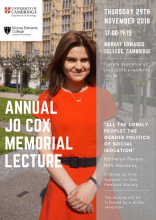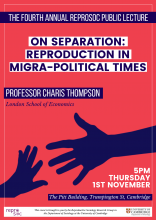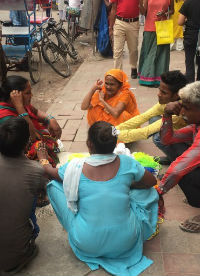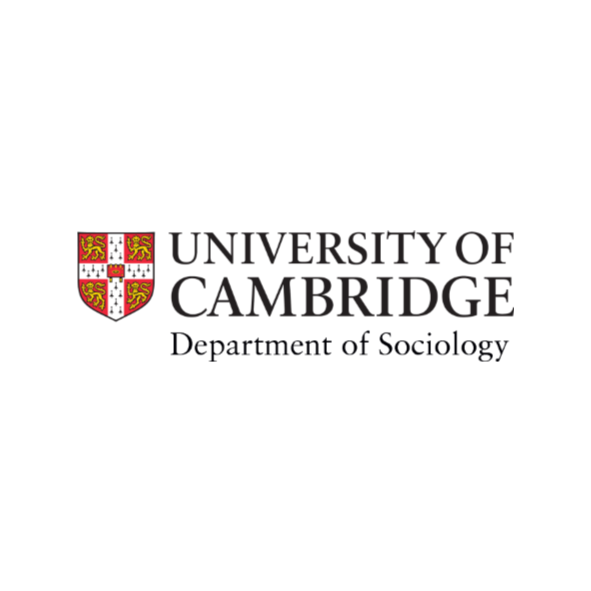Events Archive
This page features our past events from January 2018 to November 2024.
Our more recent past events can be found on our past events page. Please visit our upcoming events page to see future events.
Sociology Seminar Series 2024 - 25The latest research and thought on contemporary sociology presented by leading and international sociologists. All talks are followed by an audience Q&A. This year’s series is convened by Professor Patrick Baert.All staff and students, graduate and undergraduate, are welcome! | |
Cambridge Sociology Society: Book talk with Sharon M. Quinsaat4.30pm Friday 22 November | Sociology Seminar Room, Free School Lane Sharon M. Quinsaat Associate Professor, Department of Sociology, Grinnell College, will talk about her new book, 'Insurgent Communities: How Protests Create a Filipino Diaspora' which sheds light on the formation of diasporic connections through transnational protests and the dynamic process through which a diaspora is strategically constructed. | |
Cambridge Sociology Society: In conversation with Professor Eduardo Bonilla-Silva16.30 Mon 4 November 2024 | Babbage Lecture Theatre, David Attenborough Building, New Museums Site Cambridge University Sociology Society is delighted to host Professor Eudardo Bonilla-Silva at an open forum event. All welcome! | |
How Can the Palestinian Digital Economy Stay Resilient Amid Crisis?5.30pm Friday, 1 November | Lecture Theatre A, Student Services Centre, CB2 3PT A panel discussion and call for action, hosted by Cambridge Palestine Solidarity Campaign, Cambridge 4 Palestine and Decolonise Sociology. | |
Book talk: Tahrir, Gaza and Beyond5pm Thursday 24 October | Sociology Seminar Room, Free School Lane | |
Film Screening: No City for WomenLucia Windsor Room, Newnham College, CB3 9DA This screening of the award-winning documentary No City for Women (60 mins) was postponed. It was to be followed by a Q&A with Prof Manali Desai, PI of the GendV project, and Dr Shannon Philip, GendV Postdoctoral Researcher. | |
Talking Embryos: changing public perceptions of embryo researchThurs 9 May 2024, 18:30 - 19:30 | The Royal Society, Carlton House Terrace, London and online (Recorded) Professor Sarah Franklin discussed her research into public perceptions of IVF and embryo research for the Royal Society’s Wilkins-Bernal-Medawar Prize Lecture. | |
AI and Human RightsTue 7 May 2024, 17.30 - 19.00 | Sociology Seminar Room, Cambridge, CB2 3RQ The Centre of Governance and Human Rights hosted an engaging expert panel discussion on the intersection of artificial intelligence and human rights. Moderated by Dr Ella McPherson and Dr Sharath Srinivasan, Co-Directors of the Centre of Governance and Human Rights, this event featured insightful contributions from leading thinkers in the field. | |
Movie Screening: The Cost of ConvenienceMon 6 May 2024, 17.00 - 19.00 | Sociology Seminar Room, Cambridge, CB2 3RQ The Centre of Governance and Human Rights screened The Cost of Convenience, a documentary which examines the impact of internet platforms on our mental health, our communities, our democracy, and our human rights. Following the screening there was an in-person Q&A with director David Donnelly, co-star Dr Ella McPherson, and composer Michael Csanyi-Wills. | |
Gender Fluidity: progress and pushbacks in the UK todayTuesday 30 April 2024, 12:15 – 14:00 | Seminar Room, Department of Sociology, Free School Lane Drawing on her research on gender diversity, recognition and social change, Professor Sally Hines, University of Sheffield, considered both the gains and the losses in understandings and practices of gender fluidity in the contemporary UK. This event was part of the Lunchtime Seminar Series 2023-2024. | |
lgbtQ+@cam Rainbow Lecture: Violet VisionsThursday 25 April 2024, 17:00 - 18:30 | Lecture Theatre A, Student Services Centre and on-line (Recorded) lgbtQ+@cam were delighted to welcome the Q+ Qantabrigian Fellow, Sandi Toksvig, to give the Rainbow Lecture 2024, entitledViolet Visions, followed by a drinks reception. This event was recorded and is available to view on the lgbtQ+@cam YouTube channel. | |
Cambridge Students X The Decolonial Centre // Collaboration for LiberationMonday 11 Mar 2024, 12:15 PM - 2:00 PM | Seminar Room, Department of Sociology The Decolonial Centre, a new project of the Pluto Educational Trust, invites you to join the movement towards anti-colonialism, decoloniality, and decolonization. This collaboration event brought students from all disciplines together to imagine ways to promote decolonial thinking, advocate for social justice, and inspire collective action towards decolonization. | |
Sociology Lunchtime Seminar: Policing Empires: Militarization, Race, and the Imperial Boomerang in Britain and the USWednesday 6 March 2024, 12:30 – 14:00 | Sociology Seminar Room and on-line (Recorded) Professor Julian Go, University of Chicago, drew upon his recently published book, Policing Empires, to offer a postcolonial historical sociology of police militarization in Britain and the United States. It tracks when, why, and how British and US police departments have adopted military tactics, tools, and technologies for domestic use since the founding of modern policing in the nineteenth century into the present. Chaired by Dr Filipe Carreira da Silva, University of Cambridge. This event was part of the Lunchtime Seminar Series 2023-2024. | |
Cambridge Sociology Society: In conversation with Professor Julian GoTues 5 November 2023, 18:15 - 20:00 | Seminar Room Department of Sociology (Recorded) Cambridge University Sociology Society was delighted to host Professor Julian Go at an open forum event focussed on his work, both older and more recent and related topics. Professor Go responded to audience questions and ideas. A titan of postcolonial thought, Julian Go is Professor of Sociology and Faculty Affiliate in the Center for the Study of Race, Politics & Culture & The Committee on International Relations at the University of Chicago. | |
Colonizing Palestine: The Zionist Left and the Making of the Palestinian NakbaWednesday 28 February 2024, 12:15 – 14:00 | Seminar Room, Department of Sociology, Free School Lane Based on extensive empirical research in local colony and national archives, Dr Areej Sabbagh-Khoury's Colonizing Palestine offered a microhistory of frontier interactions between Zionist settlers and indigenous Palestinians within the British imperial field. This event was part of the Lunchtime Seminar Series 2023-2024. | |
Department of Sociology: Lunchtime Seminar SeriesThe Sociology Seminar Series addresses current issues in sociology and features speakers from the Department of Sociology here in Cambridge, and further afield. The 2023-24 series was convened by Professor Sarah Franklin. | |
Black British Voices Project: the final report (postponed)Tuesday 23 January 12:15 – 14:00 | Seminar Room, Department of Sociology, Free School Lane In this seminar, lead BBVP researcher Dr Kenny Monrose, and other members of the BBVP, will give an account of the project’s aims and methods, its main findings, and the implications these have for future research. This event was part of the Lunchtime Seminar Series 2023-2024. | |
9th Annual Public ReproSoc Lecture 2023 Reproductive Cause and Effect: a sociological perspectiveThursday 23 November 2023, 17:00 – 18:30 | Arts Lecture Theatre, New Museums Site Speaker: Professor Sarah Franklin. In anticipation of its transition to a virtual network, this lecture looked back at the work of the Reproductive Sociology Research Group over the past decade in terms of how we understand reproductive cause and effect. | |
Cambridge Sociology Society: In conversation with Professor Patricia Hill CollinsWeds 15 Nov 2023, 16:00 – 18:00 | Seminar Room Department of Sociology (Recorded) CU Sociology Society was pleased to welcome Professor Patricia Hill Collins (University of Maryland) for a talk on her latest work, a rich conversation around student questions, and a broader discussion of Sociology as a discipline. | |
Big Data and Society Colloquium 2023: data practices and digital social worlds19, 26 October, 9, 21 November 2023 | on-line Organised by the journal Big Data & Society together with the Department of Sociology and the Planetary Praxis research group at the University of Cambridge, this four part interdisciplinary colloquium focussed on digitally mediated data collection practices. | |
Sociology Lunchtime Seminar - Bringing the Masses Back In: Explaining Spontaneous Uprisings from the French Revolution to Black Lives MatterTuesday 7 November 2023 | 12.30 – 14:00 | Sociology Seminar Room and on-line Dr Benjamin Abrams, UCL, examined why and how ordinary people spontaneously protest, riot, and revolt en masse. Drawing on comparative historical research, he showed how people may organically mobilize when a cause speaks to their pre-existing dispositions and when social conditions facilitate their participation. | |
Sociology Lunchtime Seminar - The End Everyday Racism Project at Cambridge: 2023 Report Launch and FindingsTuesday 10 October 2023 | 12.30 – 14:00 | Sociology Seminar Room and on-line The team from the Department of Sociology's End Everyday Racism project presented the findings from their 2023 report. These were based on anonymous testimonies gathered from the Cambridge community, using the project's digital witnessing platform and based on a methodology of solidarity. | |
Liminal Texts: Writing Society Between Literature And SociologyFriday 13 October 2023 | 10:00 - 16:30 | Selwyn College, Grange Road, Cambridge and on-line This event explored the ways in which we write sociologically, and the types of texts that inhabit multiple realms within and outside of sociology and literature. | |
Workshop on Critical Data Research in Praxis12 June 2023 | 12pm to 5pm | Room SG1, Alison Richard Building, 7 West Road Cambridge CB3 9DT How can research make global-scale claims in a way that is attentive to local agencies? What collaborations are possible between academia and marginalised communities? This workshop, for PhD scholars and more senior academics, hosted by CGHR co-directors Dr Ella McPherson and Dr Sharath Srnivasan, addressed these and other questions. | |
Archiving the Algorithm: Research & Arts Based Workshop and opportunity to participate in a short film project25 May 2023 | 10am - 11am (workshop) | 11am -11.45am (film project) | Hopkinson Lecture Theatre, New Museum Site Led by Isabelle Higgins, PhD candidate in the Sociology Department, and Josh Vyrtz, an interdisciplinary visual artist, this interdisciplinary research and visual arts-based workshop focused on approaches to the study of our algorithmic experiences in social media. It included participant discussion and the opportunity to contribute thoughts and experiences to a short creative film. | |
The GendV Project Conference12 May 2023 | 9am – 5pm | The Pitt Building, Trumpington St, Cambridge CB2 1RP, The GendV Project is an ESRC-funded research project on Urban Transformation and Gendered Violence in India and South Africa. Discussants included: Professor Amanda Gouws, Stellenbosch University; Professor Julia Kowalski, University of Notre Dame; Professor Rupal Oza, Hunter College and Professor Shireen Hassim, Carleton University. | |
Violence, Theory and Society11 May 2023 | 5pm – 6pm | Alison Richard Building, 7 West Road Cambridge CB3 9DT The GendV project keynote was given by Professor Sylvia Walby OBE (Royal Holloway, University of London). | |
Who is Afraid of Gender?Public lecture by Professor Judith Butler, University of California, Berkeley. This sold out event was recorded and is available to view on the lgbtQ+@cam YouTube channel. | |
The public cost of personal hardship: evaluating the hidden expense of cost-cutting measures on social wellbeing24 - 25 Apr 2023 | All day | Online event (Recorded) This two-day online conference critically examined narratives of economic efficiency associated with cost-cutting paradigms, by thinking about externalised and overlooked costs of personal hardship and financial instability arising in economic austerity. Convenor: Dr Niamh Mulcahy | |
Conference: Reproductive Justice in a Post-Covid World: Transnational Protest and Resistance18 -19 Apr 2023 | 9am - 6pm | Downing College, University of Cambridge and on-line How does the study of contemporary reproductive activism, during and after the global pandemic, shed new light on our understandings of power, protest, and resistance, specifically in relation to reproductive health and rights? This conference brought together queer, transnational, intersectional, decolonial and antiracist approaches to answer this question and others. View conference programme. | |
CAMBRIDGE FESTIVAL EVENT: The Four-day Week: Here to Stay?31 March 2023 | 6pm-7pm | Lecture Theatre A - University of Cambridge Admissions Office, New Museums site, CB2 3PT Professor Brendan Burchell, Department of Sociology and Dr David Frayne, Research Associate, Digital Futures at Work Research Centre, University of Cambridge reported on the results of their research and recent trial of a four-day working week, which has seen dozens of companies reducing their working time without any loss in pay. They discussed staff well-being, business performance, and how these companies made it work on the ground. | |
Challenges in studying right-wing populism: a global perspective28 Mar 2023 | All day | Alison Richard Building, 7 West Road, Cambridge, CB3 9DT The flourishing of populist politics worldwide has led to proliferating scholarship on the causes, characteristics and implications of right-wing populism for democratic societies. This conference addressed the ethical and emotional challenges researchers experience, bringing them together to share experiences and explore the tensions in studying what Susan Harding famously termed ‘repugnant others’. | |
CAMBRIDGE FESTIVAL EVENT: Is populism destroying the media?Ayala Panievsky, PhD candidate at the Department of Sociology, discussed the impact populism is having on the media with journalist Emily Maitliss. Chaired by Dorothy Byrne, President of Murray Edwards College. | |
Department of Sociology: Lunchtime Seminar SeriesThe Sociology Seminar Series addresses current issues in sociology and features speakers from Department of Sociology, and further afield. The 2023 series was convened by Professor Sarah Franklin. | |
POWER IN NARRATIVE AND NARRATIVES OF POWER IN HISTORICAL SOCIOLOGY Speaker: Professor Hazem Kandil, Chair: Seetha Tan. This event was part of the 2023 Seminar Series. | |
Are Wars Rational? If so, for whom?Monday 20th February 2023, 17 Mill Lane This talk by Professor Michael Mann, Honorary Professor and Director of Research at the University of Cambridge and Professor of Sociology at the University of California, Los Angeles, was convened by Professor Hazem Kandil. | |
Sociology Seminar SeriesMichaelmas Term 2022The Sociology Seminar Series is a showcase of sociological excellence on a broad range of contemporary topics. The 2022-23 series was convened by Dr Sarah Franklin. | |
The 8th Annual Public ReproSoc Lecture: Regulating Reproduction RevisitedWeds 23 Nov 2022, The Pitt Building (Recorded) Prof Emily Jackson (London School of Economics) revisited some of the themes of her 2001 book Regulating Reproduction: Law, Technology and Autonomy, in which she argued that women’s reproductive autonomy should be better protected by the law. Have things improved over the last 21 years? Chaired by Professor Sarah Franklin. | |
The Forest MultipleThu 27 Oct – Fri 28 Oct 2022, Jesus College This symposium and workshop engaged with the “forest multiple” (cf. Mol, 2002) to consider the pluralistic mobilizations and inhabitations of forests across varying contexts. Given that forests are increasingly digitalized, whether through monitoring technologies, precision forestry, or supply chain tracking, this event took stock of the forest epistemologies and ontologies that are reproduced and amplified within digital logics, and how they are also transformed through different mobilizations of digital technologies, whether through counter-actions or refusals to participate. | |
Beyond MilitarismThu 22 Sep - Fri 23 Sep 2022, Sidgwick Site This two-day conference pushed for a fresh reckoning with the very foundations necessary for making, and making sense of, war, empire, peace, and security in the present. Keynote speakers included Professor Sunny Xiang (Yale) and Professor Neel Ahuja (UMD). | |
Post-Windrush Generation: Black British Voices of ResistanceFri 6 May - Sat 7 May 2022, Woolf Institute This pathbreaking conference explored what it really means to be black in Britain, providing a space for leading black commentators to address a range of core themes including identity, belonging, recognition and resistance. | |
Food and Reproduction: an online symposium4 - 5 May 2022How can we think about the role of food in reproduction, childcare and parenting? Which meanings are attributed to food in discussions of fertility, pregnancy or childfeeding? And what can we learn from these discourses about gender, race or class? This symposium explored insights from reproduction, parenting, food and environmental studies to explore how food is articulated with reproduction, from fertility to parenting. | |
Sociology Seminar SeriesMichaelmas 2021 - Lent 2022 (Recorded)Each year, the Department hosts expert speakers from around the world to speak on a variety of contemporary sociological topics. The 2021/22 series was convened by Dr Ali Meghji. Speakers included: | |
A Feminist Theory of ViolenceTue 15 March 2022 (Recorded) Mainstream feminism conversations about violence are a repertoire of victimization: harassment, rape, abuse, femicide. In this talk, Prof Françoise Vergès - French political scientist, historian, film producer, independent curator, activist and public educator - presented the argument of her book, A Feminist Theory of Violence. Chaired by Sophie Marie Niang. | |
Decolonizing the Harm and the Cases of Forced Sterilization in PeruPostponed A Centre for Latin American Studies (CLAS) Open Seminar, to have been presented by Dr Julieta Chaparro-Buitrago. | |
Freezing Fertility documentary screeningFri 11 March 2022 This screening of the VPRO documentary Freezing Fertility was followed by a live Q&A with Lucy van de Wiel. | |
"The Undisciplined Readers" (Decolonise Sociology reading group)Fri 28 Jan, Fri 11 Feb, Fri 25 Feb and Fri 11 March 2022 The Decolonise Sociology Reading Group collaborated with artists and academics from "Monumentoclasm: workshop in anti-colonial imagination" to discuss pre-circulated texts. | |
Tech-Talk with Prof Judy WacjmanThurs 10 March 2022, Darwin College, Old Library The Technology & New Media Research Cluster hosted distinguished Professor Judy Wajcman (LSE) for a talk on "Optimizing Temporal Capital: How Big Tech Imagines Time as Auditable". | |
End Everyday Racism Campaign WeeksMon 21 Feb - Fri 4 March 2022 The End Everyday Racism Project led a two-week campaign for students and staff to share their experiences of racism in Cambridge. Dr Mónica Moreno Figueroa and Dr Ella McPherson led a series of group sessions where those affected by racism can share a safe space to talk about their experiences in a way that recognises and affirms what has happened, and build community and solidarity in the face of discrimination. | |
Chemical Warrior with Hamish de Bretton Gordon OBEFri 25 Feb 2022, Cripps Auditorium, Magdalene College Hamish de Bretton Gordon was in conversation with broadcaster and Sociology PhD, Dr Saleyha Ahsan, to discuss his book, Chemical Warrior and to examine the future biological threats and mitigation. | |
Where next for poverty in Britain?Tue 1 Feb 2022 Prof Tracy Shildrick, University of Newcastle This talk outlined how poverty and economic inequality has become hard baked into the social and economic fabric of British society to the point that despite widespread affluence and wealth for many, poverty has become a normalised condition for significant swathes of the population | |
Decolonise Sociology: Open Committee MeetingsMichaelmas 2021The Decolonise Sociology committee for 2021 was chaired by Dr Ali Meghji. | |
Political Sociology Research ClusterThe Political Sociology Research Cluster meets on a biweekly basis to examine the role of social inequality, ideology, social movements, public opinion, nationalism, and political participation in society. A text is pre-selected and circulated in advance so that people can prepare for a discussion. | |
Traces of a (faded) past: materiality, memory and anticolonial EgyptTue 30 Nov 2021 (Recorded) Thinking with Egypt’s project of decolonisation in the mid-twentieth century, Dr Sara Salem (The London School of Economics and Political Science) focused on the varying ways in which anticolonial pasts express themselves in the present, and what this might suggest about the future. | |
The Limits of Choice: Non-Heteronormative Reproductive Tactics in PolandTue 23 Nov 2021 (Recorded) Professor Joanna Mizielińska (Institute of Psychology, Polish Academy of Sciences) gave the 7th Annual ReproSoc Public Lecture. | |
Debating the Drug War: Racial Politics, Mass Media, and the War on DrugsTue 16 Nov 2021 (Recorded) Since President Nixon coined the phrase, the "War on Drugs" has presented an important change in how people view and discuss criminal justice practices and drug laws. The term evokes images of militarization, punishment, and violence, as well as combat and the potential for victory. Through analysis of 30 years of newspaper content and thousands of internet comments, Dr Michael Rosino (Molloy College, NY) illuminated the role of racial silence, code words, and identity construction in the drug policy debate. | |
Colonialism and Modern Social theoryTue 2 Nov 2021 (Recorded) What does it mean to ‘decolonise’ a curriculum of sociology and social theory in which colonialism has been unrecognised? Prof Gurminder Bhambra (Sussex University) and Prof John Holmwood (University of Nottingham) discussed cuts to the heart of Sociology as a discipline, arguing that rather than simply adding colonialism to sociology’s repertoire of topics, instead that repertoire must change and the concepts and methodologies with which it is associated be transformed. | |
In conversation with Amandine GayThur 21 Oct 2021, McCrum Lecture Theatre (Corpus Christi) Amandine Gay is a French feminist, filmmaker, researcher and actress. Her first film Ouvrir la Voix (2016) was a documentary giving voice to Black women in France that aims to give an other approach of feminist movements. She spoke to Sociology PhD Sophie Marie Niang about her upcoming film, Une Histoire à Soi (A Story of One’s Own, 2021), and the broader themes of her work. | |
Epistemic positioning and epistemic injusticeTue 19 Oct 2021 (Recorded) Why is the curriculum white? Must Black and minority ethnic academics write on ‘race’? Who gets cited in bibliographies, and who gets credited in acknowledgments or footnotes? Who coined the term ‘Matthew Effect’? What is the relationship between these questions and who gets to stay in the academia? This seminar introduced a theoretical framework that connects informal judgments of intellectual value or ‘worth’ with inequalities in the academic profession, including those of gender and ethnicity/race. Dr Jana Bacevic (Durham University) sketched the contours of an intersectional political economy of knowledge production. | |
Daughters and Sons of the Post-Windrush Generation: Reflections and New DirectionsTue 22 June 2021 (Recorded) The Centre for the Study of Global Human Movement and Wolfson College hosted this special panel discussion on the legacies of Windrush and connections to contemporary academic scholarship. | |
Jo Cox Memorial Lecture with Rt Hon Jacqui SmithWed 16 June 2021 (Recorded) The Department of Sociology and Murray Edwards College jointly celebrated Jo Cox's life and her inspiring work with the 4th annual lecture in this memorial series. | |
Reproduction, Sexuality and War: Reflections from Latin AmericaWed 12 May 2021 (Recorded) This panel discussion was about reproduction and sexuality in Latin America, chaired by Dr Julieta Chaparro-Buitrago, and sponsored by ReproSoc and Instituto Pensar (Universidad Javeriana). | |
Sociology Seminar SeriesLent 2021 (Recorded)Each year, the Department hosts expert speakers from around the world to speak on a variety of contemporary sociological topics. The 2021 series was convened by Dr Ali Meghji. | |
Data into TheoryLent 2021 (Recorded)Data into Theory was a Sociology series showcasing research by early career members of the department and funded research teams. It was designed to focus on our style of practice – in particular the ways we develop new analytical concepts based on original empirical data and the pathways that we may take to get there. | |
Black Lives Matter: Has anything really changed?Wed 31 March 2021 (Recorded) This panel discussion featured Pragya Agarwal, Ali Meghji, Monica Figueroa and Kehinde Andrews. Chaired by Kamal Munir. It was part of the Cambridge Festival. | |
Inflections of Anti-Racism in Latin AmericaWed 24 March 2021 In this talk, hosted by the LSE Department of Sociology, Dr Mónica Moreno Figueroa and Dr Peter Wade discussed the findings of their research into different styles of antiracist activity in four countries: Brazil, Colombia, Ecuador and Mexico. | |
Data into Theory: "Epistemicide"Tue 16 March 2021 (Recorded) Knowledge was essential to colonisation. This seminar questioned how the project of epistemicide continues into the present, and how we can think against and outside of this epistemicide. The panellists were Sophie Marie Niang, Melz Owusu, and Jonathan Yong, chaired by Dr Ali Meghji. | |
Decolonise Sociology: Open Committee MeetingsLent 2021In 2021, the committee was chaired by Dr Ali Meghji. | |
Nationalism as a sociological problemTue 2 Mar 2021 (Recorded) This session consisted of two complementary presentations followed by a Q&A, chaired by Dr Ali Meghji. The presentations were titled: ‘Bordering, Othering, and Patriotism’ (Dr Meghan Tinsely, University of Manchester), and 'The Futile Folly of Left Nationalism' (Dr Sivamohan Valluvan, Warwick University). This event was part of the 2020-21 Sociology Seminar Series. | |
LGBT+ History Month (Feb 2021)LGBTQ+ officers across different colleges as well as LGBT+ Campaign of the Students' Union organised an incredible array of events. | |
Decolonizing Sociology Book LaunchFri 26 Feb 2021 (Transcribed) This digital book launch for Dr Ali Meghji’s ‘Decolonizing Sociology’ was held via Twitter. Dr Meghji posted a thread of some of the key arguments contained in his book, and some of the open questions contained in the discussions of postcolonial and decolonial approaches to/in sociology. The book explores why, and how, sociology needs to be decolonized. It analyses how sociology was integral in reproducing the colonial order, as dominant sociologists constructed theories either assuming or proving the supposed barbarity and backwardness of colonized people. Ali Meghji reveals how colonialism continues to shape the discipline today. | |
What role does culture play in (in)equality?Tue 16 Feb 2021(Recorded) This panel discussion explored a series of interrelated sociological questions around culture and inequality, with Dr Nirmal Puwar (Goldsmiths University), Dr Anamik Saha (Goldsmiths University), Dr Anna Bull (University of Portsmouth) and Dr Clive James Nwonka (LSE), chaired by Dr Ali Meghji. It was part of the 2020-21 Sociology Seminar Series. | |
Sexual Citizens: Sex, Power, and Assault on CampusTuesday 2 Feb 2021 (Recorded) The fear of campus sexual assault has become an inextricable part of the college experience. Research has shown that by the time they graduate, as many as one in three women and almost one in six men will have been sexually assaulted. Drawing on the Sexual Health Initiative to Foster Transformation (SHIFT) at Columbia University, the most comprehensive study of sexual assault on a campus to date, Jennifer S. Hirsch (Columbia Population Research Center) and Shamus Khan (Columbia University) presented an entirely new framework that emphasizes sexual assault's social roots—transcending current debates about consent, predators in a "hunting ground," and the dangers of hooking up. This event was part of the 2020-21 Sociology Seminar Series. | |
Syria’s displaced health workforce: Policy opportunities and challengesWednesday 27 January 2021 (Recorded) This policy briefing and panel discussion was organised by the Syria Public Health Network in collaboration with R4HC: Research for Health in Conflict project at King’s College London, American University of Beirut, and the University of Cambridge. The health of Syrians and the healthcare system in Syria have been overwhelmed after years of conflict. Healthcare workers (HCWs) and healthcare facilities have been criminalized and systematically attacked. This briefing presented the latest data and information on the situation of HCWs within Syria, neighbouring frontline countries as well as Europe. Case studies and policy options for host community governments were outlined demonstrating how displaced HCWs can be supported, not only helping displaced individuals and their families, but also the health and social welfare systems of host countries. | |
The GendV Project Launch: Gendered Violence in India and South AfricaFri 22 Jan 2021 (Recorded) This conversation with Professor Pumla Dineo Gqola (Nelson Mandela University, South Africa) and Professor Srimati Basu (University of Kentucky) focused on Gendered Violence in India and South Africa. It was the first of a series of public events hosted by The GendV Project, which aimed to explore the many urban transformations and changing gender relations in Gurgaon and Delhi, India and Johannesburg, South Africa. The project was funded by the Economic and Social Research Council (UKRI) and aimed to develop a blueprint for a new generation of scholarship on gendered violence, specifically in the case of public and private sexual violence. | |
Inequality and Bridging Group Boundaries through Narratives of HopeTue 1 Dec 2020 (Recorded) With its focus on material success, competition and self-reliance, neoliberalism has generated stronger class and ethno-racial boundaries. One way forward is broadening cultural inclusion by promoting new narratives of hope, argues Professor Michèle Lamont (Harvard University). In this talk, Professor Lamont examined how this is achieved by discussing how "agents of change" in entertainment, education, philanthropy, religion, advocacy, and other sectors, contribute directly or indirectly to diffusing new frames about our collective future and identities. She also described how American Gen Zs promote authenticity, diversity, and sustainability and thus contribute to diversity and a weakening of group boundaries. This event was part of the 2020-21 Sociology Seminar Series. | |
"The Afterlife of Eugenics: Incarcerated Women and the Fertility Continuum" with Prof France Winddance TwineMon 30 Nov 2020 (Recorded) The 6th annual ReproSoc lecture was given by Prof France Winddance Twine (University of California, Santa Barbara), with an introduction by Professor Sarah Franklin. The event was chaired by Dr Katharine Dow. | |
Queer Migrations: Transnational Sexualities in Theory and PracticeFri 27 Nov 2020The objective of this conference was twofold: firstly, to restore visibility to the queer migrant in cultural, sociological, political, theoretical and methodological debates on globality and migration; and secondly, to challenge the socio-political and racialised narrativization of the queer migrant experience as a journey from the ‘backward’ global South to the ‘progressive’ global North. | |
Crunch Time: How Married Couples Confront UnemploymentTue 17 Nov 2020 (Recorded) Based on her book, 'Crunch Time: How Married Couples Confront Unemployment', Aliya Hamid Rao (London School of Economics) gets up close and personal with college-educated, unemployed men, women, and spouses to explain how comparable men and women have starkly different experiences of unemployment. This event was part of the 2020-21 Sociology Seminar Series. | |
Re/Igniting Walter Rodney's Legacy for Today's Black Lives Matter MovementWed 11 Nov 2020 (Recorded) This conference explored the legacy of Walter Rodney (author of "How Europe Underdeveloped Africa") and considered how his thought and example can inspire academics and activists today. | |
Reactionary Democracy: How Racism and the Populist Far Right Became MainstreamTue 3 Nov 2020 (Recorded) Dr Aurelien Mondon (University of Bath) and Dr Aaron Winter (University of East London) explored the legitimisation and mainstreaming of racism and the far right through a variety of processes, such as the construction and racialisation of 'the people' or demos as white, 'populist hype', euphemisation and liberal tropes such as free speech. They argued that this has not only made racism more acceptable, but emboldened racists, including the far right, once seen as the unacceptable face of what Mondon and Winter term 'illiberal racism'. In addition to examining this process and history, they also discussed what we need to do as anti-racists to not only fight racism and the far right, but ensure democracy is itself progressive. This event was part of the 2020-21 Sociology Seminar Series. | |
Queer Feminist Approaches to Social Reproduction in the Environmental CrisisFri 23 Oct 2020 This conference sought to rethink the relations between white heterocapitalist patriarchy and environmental destruction through a re-engagement with the politics of social reproduction. It explored how the social and political organisation of the ‘family’ has ramifications in terms of sexual and gender politics, as well as impacting directly upon the environment in potentially negative ways. This conference aimed to engage with these conflicts and more, calling into conversation queer, transnational and intersectional feminist perspectives on social reproduction in the age of environmental destruction. Speakers included Professor Sarah Franklin (University of Cambridge); Dr Jade Sasser (University of California, Riverside); Dr Sophie Lewis (Independent Scholar); and Dr Mwenza Blell (Newcastle University) | |
(Un)settling epistemologies through digital toolsThu 22 Oct 2020 What happens when digital data flows between people and machines echoes across borders, is interpreted, re-coded, transformed and analysed as it travels across digital spaces? What tools could we use to verify this rapidly-proliferating digital information? Under the CGHR umbrella, and in collaboration with the Office of the United Nations High Commissioner for Human Rights (OHCHR), The Whistle team developed two online resources designed to broaden participation and unsettle knowledge production in the digital space. The Human Rights Digital Toolkit (HRDT) is a decision tree model which provides an updated overview of current open-source investigation (OSINT) digital tools that can be used in fact-finding. It is meant to be used by human rights investigators, who are increasingly relying on digital data. | |
End Everyday Racism Report LaunchFri 16 Oct 2020 (Recorded) The End Everyday Racism project launched their first report, based on testimonies and eyewitness accounts from over 100 students and staff at the university. The result is a picture of continued everyday racism at the university, highlighting how much still needs to be done to create a supportive environment for black and minority ethnic students, and to create a genuine zero-tolerance approach to racism in Cambridge. The event was chaired by Dr Monica Moreno Figueroa and Dr Ella McPherson, and co-hosted by the Cambridge SU BME Campaign. | |
The role of risk in women’s heterosexual sexting practicesTue 2 June 2020Dr Rikke Amundsen, Teaching Associate, Department of Sociology, University of Cambridge This presentation considered the role of risk in women’s heterosexual sexting practices. Dr Amundsen drew on interview material collected for a research project on women’s digitally mediated experiences of creating, sending and receiving private sexual images - an activity also known as 'sexting'. She examined how these women cast their own sexting practices as a form of ‘mediated intimacy work’ constituted by a constant negotiation of the risk that their sexting material might be distributed further online without their consent – an activity that I refer to as ‘digital image abuse’. I explored how this risk of digital image abuse informed not only the women’s acts of sexting as intimacy work, but also their perceptions of intimacy and of what it means to be intimate with someone. She argued that the risk inherent in creating and sharing sexting material was not simply perceived as an obstacle to intimacy, but also as a resource so as to further enhance it. | |
Asylum & FGM WebinarFri 8 May 2020 (Recorded)This webinar covered asylum law, policy and FGM protection orders in the UK, and was followed by a Q&A that advises those working in safeguarding, advocacy and victim support. Dr Charlotte Proudman is a Barrister at Goldsmith Chambers and a Research Fellow at Queens' College, Cambridge, and Dr Peter W. Walsh is a researcher at The Migration Observatory at the University of Oxford. | |
Department of Sociology: Lunchtime Seminar SeriesMichaelmas 2019 - Lent 2020 (Recorded)The Lunchtime Seminar Series is a showcase of sociological expertise both here in the Cambridge Department of Sociology and further afield. The 2019/20 lectures included: | |
Antiracism, Intersectionality and the Struggle for DignityTue 11 Feb 2020 (Recorded) This lecture, based on a text developed by Prof Mara Viveros Vigoya and Dr Mónica Moreno Figueroa, looked at intersectionality as a key strategy for antiracist work. Through an analysis of how anti-racist practices mobilise gender repertoires, Dr Figueroa asked critical questions about the links between processes of racism and sexism.This event was part of the 2019-20 Sociology Seminar Series. | |
Evidence when the evidence (alone) is the problem: Three key challenges for development research and policyTue 11 Feb 2020 Prof Michael Woolcock (Lead Social Scientist, World Bank's Development Research Group, and Lecturer in Public Policy at Harvard University) Amidst increasing calls for development policy to be 'evidence based', three key challenges (among many) need to be addressed. First, that the collection and curation of evidence – and especially national statistics – is a serious logistical and implementation challenge; second, that the credible interpretation of evidence is a serious intellectual and political challenge; and (c) imperatives to generate evidence and make it openly available means that – especially in fragile states – those actors seeking to inflict harm can now also be "more effective", creating serious ethical challenges. Instances of each of these were presented in this talk, along with suggestions for how they might be addressed. This event was part of the 2019-20 Sociology Seminar Series. | |
White Privilege: The Myth of a Post-Racial SocietyThur 30 Jan 2020 (Recorded) Professor Kalwant Bhopal, University of Birmingham, explores how processes of racism, exclusion and marginalisation operate in predominantly white spaces with a focus on social justice and inclusion. Her book "White Privilege: The Myth of a Post-Racial Society" examines evidence on the representation of BME staff and students in higher education and explores how racism, exclusion and marginalisation continue to disadvantage these groups. This event was part of the 2019-20 Sociology Seminar Series. | |
Single in the City: Women, Migration and Domestic Work in IndiaTue 28 Jan 2020 (Recorded) Professor Samita Sen, University of Cambridge, explored long-term patterns of mobility from the colonial period to understand women’s migration today in the specific context of domestic work. The lecture was followed by a discussion chaired by Dr Manali Desai. This event was part of the 2019-20 Sociology Seminar Series. | |
Decolonise Sociology: Open Committee MeetingsMichaelmas 2019For Michaelmas 2019, the committee was co-chaired by Dr Monica Moreno Figueroa and Dr Manali Desai. To join the mailing list please email decolonise@sociology.cam.ac.uk | |
Whose Biological Clock? Temporal Inevitability and Assisted Reproduction in Contemporary IndiaThurs 5 December, The Pitt Building (Recorded) Anindita Majumdar The relation between time and ageing defines the increasingly influential concept of the biological clock. This conceptualization is especially potent in relation to the reproductive body, and its expected, inevitable decline. Imagined as a ‘curse’, the ticking clock operates both as a metaphor and a tour de force in assisted reproduction in India. Anindita Majumdar is interested in seeking out the meanings of age and ageing as they come to be understood within reproduction in India. This talk focused on assisted conception, and the use of assisted reproductive technologies (ART) such as in-vitro fertilization to engage with the issue of reproductive temporality. This event was run by the Reproductive Sociology Research Group (ReproSoc). | |
Jo Cox Memorial Lecture with Rt Hon John Bercow MPWed 27 Nov 2019 (Recorded) The Department of Sociology and Murray Edwards College jointly presented this annual memorial lecture to honour the memory of Jo Cox MP. Jo Cox MP was a former student of Social and Political Sciences at Cambridge and committed politician, wife and mother. In June 2016, Jo was murdered by a far-right activist whilst working in her constituency, Batley and Spen. This 2019 lecture was delivered by former Speaker of the House of Commons, Rt Hon John Bercow MP. | |
CUSSP (Cambridge University Students on Social Policy)CUSSP was a student-led group interested in the development and discussion of national and international social policy. The group aims to bring together students from the various different subject areas to foster a creative conversation that can positively build public policy ideas that are meaningful and impactful. CUSSP focused on one social policy issue per term, with the aim to gain some insight into the complexities of the topic. They invited a range of speakers including think tanks, charities and councillors to share their knowledge and experience. In Michaelmas term CUSSP focused on homelessness, looking both at organisations working to tackle homelessness directly and at housing policy more broadly. Talks included: | |
Theoretical Synergy: Decoloniality, Critical Race Theory, and TrumpamericaTue 19 Nov 2019 Dr Ali Meghji, University of Cambridge, considered some central differences and similarities between critical race theory and decolonial thought. He argued that attempts to synthesise the two approaches are bound to fail, and that attempts to synthesise them simply reproduce the imperial episteme’s premise that theories must be ‘a theory of everything’. Against this imperial episteme, Dr Meghji instead called for a theoretical synergy between the two approaches. He used the empirical problem of Trumpamerica to demonstrate how using both a critical race and decolonial approach gives us a more complete analysis than only using one of the two; looking at the importance of racial ideology and post-racialism to Trumpamerica on the one hand, while also highlighting the centrality of postcolonial melancholia to the rise and consolidation of Trumpamerica as a particular societal constellation. The lecture concluded with a consideration of how our analyses of Trumpamerica would proceed if we maintained a critical race approach, but gave equal footing to theory(ies) from the South. This event was part of the 2019-20 Sociology Seminar Series. | |
Cambridge Migration Society - Graduate Research Seminar "Relocated confianza: Personal and structural trust in Salvadoran migration"Tue 12 Nov 2019 PhD Student Claire Moll Namasargued that the concept of confianza and its organizational role in rural El Salvador has been neglected in the various analyses of migration from the region. Namas suggested that after forty years of consistent movement from El Salvador to the United States, to gain a more holistic picture as to why people migrate, one must consider not only economics and security but also the numerous relocated networks of confianza both personal and structural. | |
“Another long and involved story”: narrative themes in the paradata and marginalia of the Poverty in the UK surveyTue 5 Nov 2019 (Recorded) Professor Ann Phoenix, University College London This talk explored the possibilities for narrative research from quantitative sources by presenting material and analyses from a study focused on the marginal comments written on the paper questionnaires completed in Peter Townsend's ground-breaking 1967-68 Poverty in the UK survey (PinUK). In the paradata study we analysed the types of marginalia recorded by the interviewers and research team and found that, in many cases, the marginalia were sufficiently storied to enable narrative analysis. This talk explored the different ways in which the interviewers constructed narrative identities for the research participants and themselves in what they wrote to the senior researchers who were responsible for running the study. Methodologically, the talk helped to illuminate both the importance of narrative analysis for historically grounded social research and why ‘paradata’, fieldnotes and marginalia are gaining currency as research material in the humanities and social sciences. The lecture was followed by a discussion chaired by Dr Monica Moreno Figueroa. This event was part of the 2019-20 Sociology Seminar Series. | |
Dog YearsThurs 17 Oct 2019, Old Library, Darwin College This screening of the powerful documentary film about the 2015 “refugee crisis”, Dog Years, featuring Noam Chomsky, was followed by a panel discussion with the filmmakers, Rocky Rodriguez, Jr., and Helen Foster. It was moderated by Cambridge sociologist Dr Jeff Miley. | |
A FLY Girl's Guide to University: Being a women of colour at Cambridge and other institutions of power and elitismFriday 11 October 2019, The Pitt BuildingLola Olufemi, Waithera Sebatindira and Suhaiymah Manzoor-Khan This panel featured the authors in conversation about the themes and importance of the memoirs, essays, poetry and prose in 'A FLY Girls Guide to University', as well as reflecting on the work as a disruption and as an emblem of hope. The event was co-hosted by FLY, WomCam and the BME Campaign, and co-sponsored by the Faculty of History, lgbtQ+@cam, Equality and Diversity and the Department of Sociology. | |
“Empowerment or Revolution? Kurdish Women’s Struggles between Two Knowledge Projects”Tuesday 8 Oct 2019 Dr Dilar Dirik (University of Oxford) Drawing on her ethnographic fieldwork as a Kurdish woman comparatively studying freedom concepts in Kurdistan and their relationship to women's ability to act politically, Dr Dirik provided an overview of the ways in which emerging notions of modernity and development are imposing new identities and concepts on Kurdish society, which clash with indigenous conceptualizations of life, politics and justice. This event was part of the 2019-20 Sociology Seminar Series. | |
The Great Transformation of Latin American Sociology, 1950-2019: From Modern Autonomy to Postmodern DenialTuesday 1 October 2019In this lecture, Dr Esteban Torres, Associate Professor of Sociology and Social Theory (Universidad Nacional de Córdoba, Argentina) analysed the dominant intellectual tendencies in Latin American Sociology in recent decades. It was followed by a discussion chaired by Dr Thomas Jeffrey Miley. | |
 | lgbtQ+@camEaster term 2019The lgbtQ+@cam programme was launched by the School of Humanities and Social Sciences in 2018 to promote research, outreach and network building related to queer, trans and sexuality studies at the University of Cambridge. |
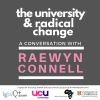 | The University and Radical ChangeFri 14 June 2019, Newnham College Cambridge (Recorded) Prof Raewyn Connell is one of Australia's leading social scientists and author of "The Good University: What Universities actually do and why it's time for radical change". Raewyn was in conversation with Dr Manali Desai, Department of Sociology. |
 | Green Seminar Series1 May, 8 May, 29 May, 12 June 2019, Magdelene College The Green Seminar Series, chaired by Professor Jennifer Gabrys, promoted global conversation about environmental research and practice, enabling people to make informed decisions about the issues that matter. Speakers included: ‘Insect Bioconversion: A Circular Animal Feed Solution’ | Matt McLaren, Entomics; ‘What's Reproduction Got to Do with the Environment?’ | Dr Katie Dow, Department of Sociology; ‘The Anthropocene: Why is it so Controversial at the Margins?’ | Dr Barbara Bodenhorn, Department of Social Anthropology; ‘Ethics and the Fossil Fuel Debate’ | Dr Rowan Williams, Master, Magdalene College |
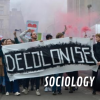 | Decolonise Sociology: Open Committee MeetingsEaster term 2019For Easter 2019, the committee was chaired by Dr Manali Desai. Find out more at www.decolonisesociology.com |
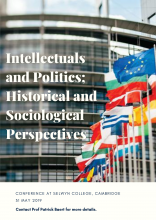 | Intellectuals and Politics; Historical and Sociological Perspectives31 May 2019, Selwyn College This interdisciplinary conference brought together sociologists and intellectual historians to explore the intersection between intellectual life and political context. The conference focused on the intersection of the intellectual and political sphere and used specific case-studies to tackle a variety of pressing questions, with the aim of forging new links, strengthening existing partnerships, and promoting cross-fertilization of ideas across both disciplinary and national boundaries. The conference was organised by Prof Patrick Baert. |
 | The Cultural Logic of Compressed Modernity: South Korea’s (Non)transition from Neotraditionalism to MulticulturalismTue 28 May 2019 Lecture from Professor Kyung-Sup Chang, Seoul National University, and visiting fellow of Clare Hall, University of Cambridge. |
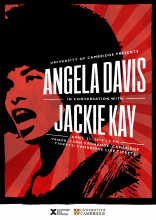 | Angela Davis in conversation with Jackie KayTuesday 23 April 2019 | Cambridge Corn Exchange (Recorded)Decolonise Sociology was thrilled to host civil rights activist Angela Davis in conversation with novelist and poet Jackie Kay on 23 April 2019 at the Cambridge Corn Exchange. This event was co-hosted by the Office for the Vice-Chancellor and co-sponsored by the: Centre for African Studies, Centre for Latin American Studies, Centre for Gender Studies, Faculty of Education, Faculty of History, POLIS, UCU Cambridge, Downing College and Lord Chris Smith, Master of Pembroke. |
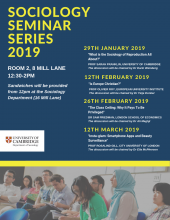 | Department of Sociology: Lunchtime Seminar SeriesLent term 2019 (Recorded)The Lunchtime Seminar Series is a showcase of sociological expertise both here in the Cambridge Department of Sociology and further afield. This term's series was co-ordinated by Dr Thomas Jeffrey Miley. Speakers included: Prof Sarah Franklin, University of Cambridge: "What is the Sociology of Reproduction All About?" |
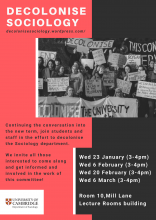 | Decolonise Sociology: Open Committee MeetingsLent term 2019Students and staff continued in the effort to decolonise the Sociology Department. For more information visit the 'Decolonising Sociology' website. For Lent 2019, the committee was chaired by Dr Manali Desai. |
| Challenges of Experimental Government and Public Policy: Evening Seminar SeriesMichaelmas and Lent terms 2018/19This seminar series brought together leading academics, practitioners and policy makers to provide empirical evidence, case studies and field stories of how they go about responding to international health crises, diplomatic incidents to designing and implementing public policy as well as researching and documenting the everyday experiences of poverty and deprivation in modern society. Funding was kindly provided by the Health Foundation and the RCUK, Global Challenges Research Fund grant: Research for health in conflict (R4HC). Speakers included: Yonatan Mendel (Ben-Gurion University of the Negev): ‘Language Policy and National Politics: Reflections on the Rise of Israeli "New Right" and the Erasure of Arabic as an Official Language’ |
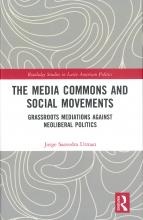 | Book Launch: The Media Commons and Social Movements. Grassroots Mediations Against Neoliberal Politics.Dr Jorge Saavedra Utman, Lecturer in Media, Culture and SocietyTuesday 5 March 2019 Discussants: Dr Abeyamí Ortega and Dr David Lehmann |
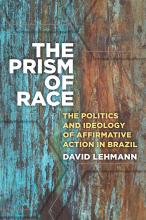 | Book Launch: The Prism of Race. The Politics and Ideology of Affirmative Action in Brazil.Dr David Lehmann, Emeritus Reader, Social Science & former Director, Centre of Latin American Studies, University of CambridgeTuesday 22 January 2019 Discussants: Peter Wade, Social Anthropology, University of Manchester; Mónica Moreno Figueroa, Sociology, Cambridge; & Pedro Mendes Loureiro, Centre of Latin American Studies, Cambridge |
| Annual Jo Cox Memorial Lecture29 November 2018, Murray Edwards College, Cambridge (Recorded) The Department of Sociology and Murray Edwards College jointly presented this annual memorial lecture to honour the memory of Jo Cox MP, a former student of Social and Political Sciences at Cambridge and committed politician, wife and mother. The lecture was delivered by Kathryn Perera (NHS Horizons), who worked with Jo Cox on her loneliness initiative, and is titled "All the Lonely People? The Gender Politics of Social Isolation". |
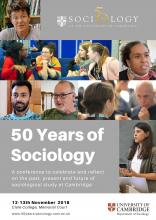 | 50 Years of Sociology12-13 November 2018 | Memorial Court, Clare College, Cambridge (Recorded) We invited current and former students and staff to celebrate 50 years of sociological study at the University of Cambridge, and to join in conversation and collective imagination about what the future may hold for sociology and for society. The conference featured a keynote lecture from Professor Patricia Hill Collins in addition to a range of panels that reflected on the past, present and future of the discipline, as well as key issues such as inequalities, changing political economies, institutional change and decolonisation. |
| On Separation: Reproduction in Migra-Political TimesThe Fourth Annual ReproSoc Lecture | Professor Charis Thompson (Recorded)1 November 2018, The Pitt Building, Cambridge Charis Thompson presented her recent work advocating the addition of a migrapolitical lens to biopolitical and necropolitical ways of understanding the differential valuing of contemporary human life. With reference to her own concept of selective pronatalism, and in conversation with other bio- and necropolitical work on stratified reproduction, reproductive justice, selecting societies, and queer reproductions, Thompson argued for the importance of considering migration as foundational, with birth and death, to a new sociology of reproduction. |
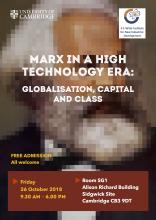 | Marx in a High Technology Era: Globalisation, Capital and Class26-27 October 2018This two-day conference featured four panels and a roundtable, themed around Marxism and contemporary issues in the digital era, as well as the launch of Sergey Bodrunov's new book "Noonomy". |
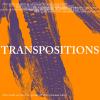 | Transpositions (Festival of Ideas)24 October 2018In honour of the work of Nobel-prize winning plant scientist Barbara McClintock, we celebrated her key concept of ‘Transpositions’ in an evening of performance, ritual, and artistic exchanges. Responding to ReproSoc's Reproductivities exhibition at Murray Edwards College, performance artist Sophie Seita reflected on the concept and choreography of transposition, queer kinship, and corn as a queer plant, and the cross-pollinating possibilities of flowery metaphors and of planting queer objects. |
| The Social Life of Work12-13 October 2018'The Social Life of Work' was an interdisciplinary conference on work and social inequalities. The conference engaged with qualitative scholarship on waged and unwaged work as well as repudiation of work, particularly in but not limited to the Global South. Twelve presenters from Sociology, Social Anthropology, History, Geography, International Development, and Gender Studies brought their varied disciplinary approaches to this exciting discussion. |
| Department of Sociology: Lunchtime Seminar SeriesMichaelmas term 2018The Lunchtime Seminar Series is a showcase of sociological expertise both here in the Cambridge Department of Sociology and further afield. Speakers included: Yesim Yaprak Yildiz, University of Cambridge: “Confession as disavowal, Public confessions of Turkish state actors of state crimes against Kurds during the 1990s” |
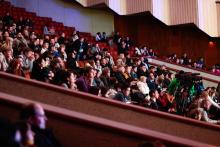 | Book launch: Your Freedom and Mine: Abdullah Ocalan and the Kurdish Question in Turkey11 July 2018, SOAS This special event marked the release of Your Freedom and Mine: Abdullah Öcalan and the Kurdish Question in Erdoğan's Turkey. Edited by Dr Thomas Jeffrey Miley and Dr Federico Venturini. Speakers included: Dimitrios Roussopoulos, political activist, ecologist, and publisher; Dr Thomas Jeffrey Miley, lecturer of political sociology at the University of Cambridge; Dr Radha D’Souza, Reader in law at Westminster University; Julie Ward MEP; Jonathan Steele, veteran journalist and author; Simon Dubbins, UNITE international director; Joe Ryan, Chair, Westminster Justice and Peace Commission. In addition, Adem Uzun, member of the Executive Council of the Kurdistan National Congress (KNK), sent a video-message. The event was chaired by Dr Federico Venturini, independent activist-researcher. |
 | The Risk Perception of Artificial Intelligence2 July 2018 Artificial Intelligence became a popular term in the last years. As any other technology, lay people and specialists perceive that it may undesired effects for humans. But, the range of such undesired effects is large and has been shaped by different social forces, in particular, by scientists, philosophers, and other intellectuals. This presentation showed an overview of the risk perceptions related to AI and how they turned to be so. |
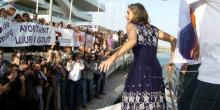 | Vessel - Film Screening on Abortion Activism29 June 2018 Murray Edwards College, Cambridge Vessel is a documentary film by Diana Whitten about the work of Women on Waves, a Dutch pro-choice organisation founded by the physician Dr Rebecca Gomperts. The film focuses on the work of Women on Waves and follows Gomperts as she sails a ship around the world and provides abortions at sea for women who have no legal alternative. Through years of successes and setbacks, we witness her create an underground network of emboldened, informed activists who trust women to handle abortion themselves. |
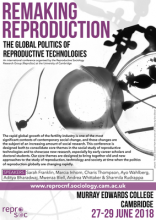 | Remaking Reproduction: The Global Politics of Reproductive Technologies27-29 June 2018 Murray Edwards College, Cambridge The rapid global growth of the fertility industry is one of the most significant contexts of contemporary social change, and these changes are the subject of an increasing amount of social research. This conference was designed both to consolidate core themes in the social study of reproductive technologies and to showcase new research, especially by early career scholars and doctoral students. Our core themes were designed to bring together old and new approaches to the study of reproduction, technology and society at a time when the politics of reproduction globally are changing rapidly. Throughout the conference, we ran concurrent panels for attendees to respond to the conference themes and share research on reproduction. The paper panels were divided across six themed streams: Race, Nation and Reproduction; Reproductive Bodies and Cultures; Changing In/Fertilities; Making New Biologies; Reproductive Futures; and Mediated Reproduction. |
 | Spain: Social Movements between Past and PresentFriday 8 June 2018 This was a chance to hear from a range of speakers and to share opinions of the social movements of Spain. |
Cambridge Series 20: Freezing Fertility, How Reproductive Ageing is changing in the 21st centurySunday 3 June 2018 Dr Lucy van de Wiel (Reprosoc) spoke at the Hay Festival 2018 as part of the Cambridge Series. She discussed how reproductive ageing is changing in the 21st century. | |
Cambridge Series 4: Digital Fakery and its ConsequencesSaturday 26 May 2018 Drawing on her research about human rights reporting in the digital age, Dr Ella MacPherson argued that digital fakery’s consequences for democracy arise not because we are duped, but because of what we do to not be duped. Chaired by Rachael Jolley, editor of Index on Censorship. | |
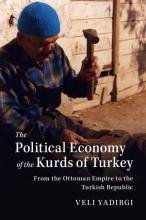 | The Political Economy of the Kurds of Turkey. From the Ottoman Empire to the Turkish Republic17 May 2018 A presentation and discussion of Veli Yadirgi's book, The Political Economy of the Kurds of Turkey. Yadirgi, who has worked as a political correspondent and editor in different media companies in Europe, analyses the socioeconomic and political structures and transformations of the Kurdish people from the Ottoman era through to the modern Turkish Republic, arguing that there is a symbiotic relationship between the Kurdish question and the de-development of the predominantly Kurdish domains, making an ideal read for historians of the region and those studying the socio-political and economic evolution of the Kurds. First outlining theoretical perspectives on Kurdish identity, socioeconomic development and the Kurdish question, Yadirgi then explores the social, economic and political origins of Ottoman Kurdistan following its annexation by the Ottomans in 1514. Finally, he deals with the collapse of the Ottoman Empire, and the subsequent foundation and evolution of the Kurdish question in the new Turkish Republic. |
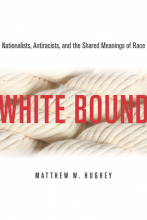 | White Bound: Nationalists, Antiracists, and the Shared Meanings of Race14 May 2018 Discussions of race are inevitably fraught with tension, both in opinion and positioning. Too frequently, debates are framed as clear points of opposition—us versus them. And when considering white racial identity, a split between progressive movements and a neoconservative backlash is all too frequently assumed. Taken at face value, it would seem that whites are splintering into antagonistic groups, with differing worldviews, values, and ideological stances. White Bound investigates these dividing lines, questioning the very notion of a fracturing whiteness, and in so doing offers a unique view of white racial identity. Dr Matthew Hughey (Associate Professor, University of Connecticut) spent over a year attending the meetings, reading the literature, and interviewing members of two white organizations—a white nationalist group and a white antiracist group. Though he found immediate political differences, he observed surprising similarities related to how both groups make meaning of race and whiteness. His talk will examine these similarities to illuminate not just the many ways of being white, but how these actors make meaning of whiteness in ways that collectively reproduce both white identity and, ultimately, white supremacy. |
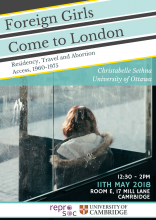 | "Foreign Girls Come to London": Residency, Travel and Abortion Access, 1960-1975 - Professor Christabelle Sethna11 May 2018 Travel is one of the central barriers to abortion access; the further a woman has to travel for an abortion, the less likely she is to obtain one and the more likely she is to be young and underprivileged. Yet, this kind of travel persists. Often conducted over long range and across domestic and international borders, “abortion tourism” remains a commonplace transnational phenomenon. Today, the case of Irish women who travel to the UK to access legal abortion services is familiar to many. However, travel for abortion services has a much longer history. This presentation was based on Christabelle Sethna’s research, funded by the Social Sciences and Humanities Research Council of Canada, which tracks women’s domestic and international travel for abortion services. It focuses on the complex transnational geopolitical and biopolitical issues raised once women began to travel to Britian for abortion services after the passage of the 1967 Abortion Act, a piece of legislation that did not include residency qualifications. The presentation explored the reasons why non-national women travelled to Britain, and to London in particular, for legal abortions in the 1960s and 1970s and discusses the transgressive relationships that exist between the crossing of sexual, legal and geographical borders. The presentation also opened up for timely consideration the fraught meanings of residency and travel across borders in the UK. Dr Christabelle Sethna is Professor in the Institute of Feminist and Gender Studies, University of Ottawa. She is a historian who researches the history of sex education, contraception and abortion as well as animal representations. |
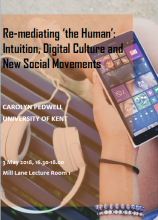 | Re-mediating ‘the Human’: Intuition, Digital Culture and New Social Movements3 May 2018 With the rise of new digital and smart technologies, ‘the human’ itself is being radically re-mediated. For some, this is problematic: digitally colonized by global capitalism at the level of affect, gesture and habit, it is argued, we are now locked into cycles of mindless consumption and thus increasingly politically disaffected. There are also, however, more hopeful visions of these new digital modes of personhood: Michel Serres (2015), for example, argues that, in delegating habits of mental synthesizing and processing to digital technologies, millennials have cleared cognitive space for the development of a more ‘intuitive’ mode of being-in-the-world. A key term in continental philosophy, as well as contemporary theories of affect, habit and media ecologies, intuition offers a form of sensorial engagement with ‘the pre-emergent’ or that which is in process. While there is no necessary link between intuition and progressive social change, this paper explores the significant resonances between the ‘intuitive digital subjects’ that Serres imagines and the logics and sensibilities of new social movements such as Occupy and Black Lives Matter. Vitally enabled by digital technologies and forms of technè, these activisms, I argue, practice ‘pre-figurative politics’: they combine a tendency to oppose exploitation and oppression with a capacity to sense change as it is happening and thus remain radically open to alternative futures. Carolyn Pedwell is Reader in Cultural Studies at the University of Kent, where she is Head of Cultural Studies and Media. |
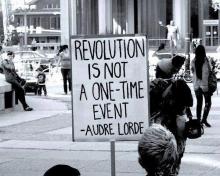 | Confrontation? Doing Feminist and Anti-Racist Work in Institutions, A Panel Discussion1 May 2018 How can we confront institutions about their role in perpetuating violence and work to make institutions more open and inclusive spaces? This panel explored some of the paradoxes and difficulties of doing feminist and anti-racist work within institutions. Even when institutions claim to be committed to equality they are often deeply unequal and hierarchical spaces. A feminist and anti-racist project is to transform the institutions in which we work. The aim of transforming institutions is still however an institutional project: we often have to work through the structures we seek to dismantle. When our political work is resourced or supported by an institution does it become more difficult to confront the institution? Does following procedures or working in house constrain the kinds of work we can do? If for strategic reasons we try to avoid confrontation what else are we avoiding? And how and why are some of us perceived as being confrontational however we are doing the work? The panel gave a chance to talk from as well as about our experiences of doing feminist and anti-racist work. We considered who does (and does not) do the work of trying to transform institutions and how these distributions of labour can reproduce inequalities. We discussed the costs of doing (and not doing) this labour and reflected on how institutions can exhaust us and wear us out. The panel opened up a discussion of how we can confront problems of institutional racism, institutional sexism (including sexual harassment and sexual misconduct) as well as institutional bullying. Speakers included: Sara Ahmed, Monica Moreno Figueroa, Lola Olufemi, Tiffany Page and Leila Whitley |
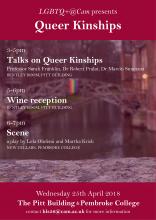 | LGBTQ+@Cambridge Presents...Queer KinshipsApril 25 2018, The Pitt Building and Pembroke College Talks on Queer Kinships from Sarah Franklin, Robert Pralat and Marcin Smietana. |
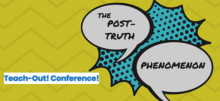 | Post-Truth Teach-Out! Conference15 - 17 March 2018 The post-truth phenomenon, ‘relating to or denoting circumstances in which objective facts are less influential in shaping public opinion than appeals to emotion and personal belief,’ as defined by Oxford Dictionaries, has been the subject of much instant commentary – though little academic analysis. This series of teach-out events and conference gave an opportunity to consolidate and advance our understanding of the post-truth phenomenon through collaborative activities and interdisciplinary conversation. |
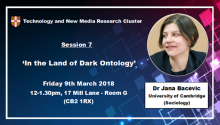 | The Technology and New Media Research ClusterFriday 9 March 2018 Dr Jana Bacevic 'On the Land of Dark Ontology'. |
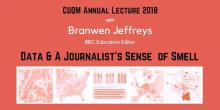 | CUQM Annual Lecture 2018Thursday 1 March 2018, Bateman Auditorium, Gonville & Caius College The Cambridge Undergraduate Quantitative Methods Centre was delighted to welcome Branwen Jeffreys (BBC Education Editor) to give the CUQM Annual Lecture 2018, on “Data & A Journalist’s Sense of Smell”. |
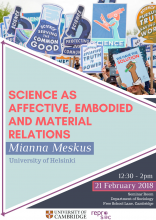 | Science as Affective, Embodied and Material Relations21 February 2018 This talk by Mianna Meskus addressed “scientific craftwork” in the use of human biological material for the benefit of biomedicine, innovation and patients’ health. A revolutionary cellular reprogramming technique has made it possible to turn human skin and blood cells into pluripotent stem cells, thus providing an unprecedented opportunity to study the pathophysiology of diseases, understand human developmental biology, and generate new therapies. Using the so called iPS cell technology as a point of entry, I examined how the foundations of biomedical knowledge production lie in embodied skill and affective engagement with cellular research material. Combining relational materialism and pragmatist philosophy of experience, I developed the idea of an instrumentality-care continuum as a core dynamic of biomedical craft, involving both researchers and patients as tissue donors. This continuum opens up a novel perspective to the commercialization and industrial-scale appropriation of human biology, and thereby to the future of ethical biomedical research. |
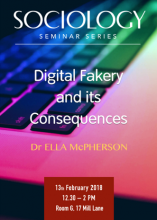 | Digital Fakery and its Consequences13 February 2018 Dr Ella McPherson, Cambridge Sociology Department. |
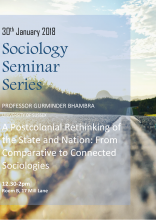 | A Postcolonial Rethinking of the State and Nation: From Comparative to Connected Sociologies30 January 2018 Professor Gurminder Bhambra, University of Essex. |






































































































